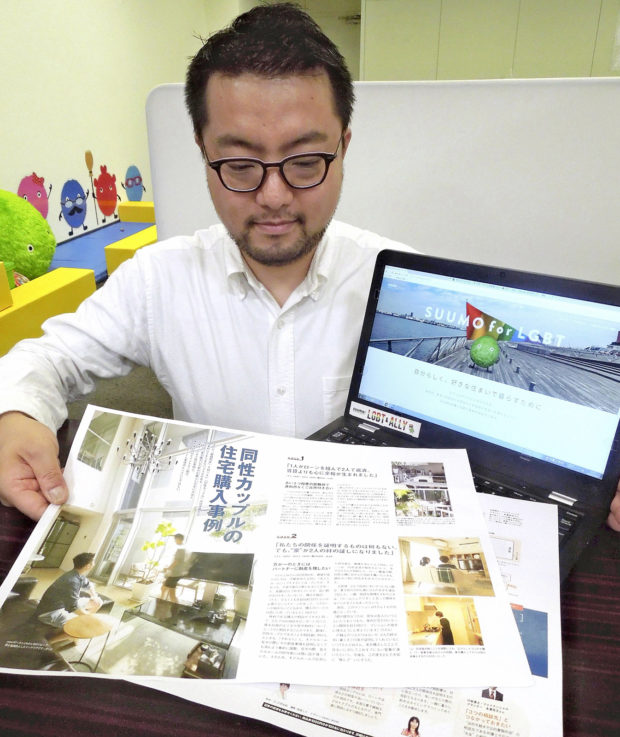TOKYO — More products and services are appearing to treat same-sex couples the same as opposite-sex couples. One factor behind the trend is that society and businesses are becoming more aware of the lesbian, gay, bisexual and transgender (LGBT) community and companies are anticipating new demand.
According to a 2015 survey by Tokyo-based advertising agency Dentsu Inc., of about 70,000 people aged from 20 to 59, 7.6 percent identified as LGBT. The market size of consumption generated by products and services geared toward the LGBT community was estimated to be about ¥6 trillion ($53.5 billion).
In January this year, Tokyo-based Sompo Japan Nipponkoa Insurance Inc. began selling car insurance policies that treat same-sex partners as spouses and it has received many inquiries about them, according to the company.
Under conventional insurance products, same-sex partners are not recognized as family members, and so they are not entitled to coverage under their partners’ plans. With changes in social awareness, the company entitled same-sex partners to coverage in insurance policies such as one that offers discounts on insurance premiums if drivers are limited to the insured person and his or her spouse.
When same-sex couples apply for these insurance products, they need to submit official public documents that prove that they are living together, such as residence certificates, and written statements that they are same-sex couples.
“Some same-sex couples switched insurance policies from other companies to ours. We anticipate significant potential for demand,” a company official said.
Sompo Japan Nipponkoa Insurance expanded the scope of service coverage in response to the moves of municipalities, the company said.
In 2015, Tokyo’s Shibuya Ward created an ordinance to issue partnership certificates to same-sex couples. Subsequently, at least eight municipalities, including Sapporo, Osaka and Fukuoka, launched similar systems, while Chiba and other municipalities are considering introducing such systems.
Against the background of such moves, new services are emerging in various fields.
Rakuten Bank, Ltd., and Recruit Sumai Co., both based in Tokyo, jointly created a new housing loan system for same-sex partners in October last year.
When double-income same-sex partners buy new condominium units at “Suumo Counter” stores operated by Recruit Sumai across the country, they can take out housing loans by combining their incomes, even without official certificates like those issued by Shibuya Ward.
A 36-year-old man living in Saitama Prefecture is currently considering buying a home with his same-sex partner.
“I married my 28-year-old partner. While I’ve lied about our relationship in the past, telling people that we’re cousins, I feel some guilt. It would be great if there were more services that treat same-sex partners as family members,” he said.
Takahisa Tanabe, 36, a vice editor-in-chief of “Suumo,” Recruit Sumai’s housing information website, is gay.
“Our rental home search website also began introducing homes openly accepting LGBT renters. We’d like to promote public understanding of the issue so that people concerned can look for homes with a sense of safety,” Tanabe said.
In addition, some mobile phone carriers such as NTT Docomo, Inc. and SoftBank Corp. make same-sex partners eligible for their family discount phone plans.
Nippon Life Insurance Co. and other insurance companies allow policyholders to designate same-sex partners as beneficiaries of life insurance policies.
On the wedding information website “Minna no Wedding,” it is possible to search for wedding venues across the nation where same-sex partners can hold ceremonies.
Maki Muraki, a representative of the nonprofit organization Nijiiro (rainbow) Diversity, which aims to create a friendly working environment for LGBT people, said, “We welcome the spread of efforts among municipalities and companies.”
“In Japan, there are no legal rights and guarantees concerning same-sex marriages. Even though there are services for LGBT people, there are many cases in which they hesitate to use them or are worried about experiencing discriminatory treatment. Further social understanding is necessary,” Muraki added.
